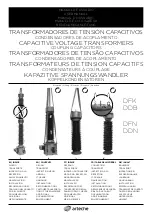
ELSEMA
1,2,4 Channel, Handheld 27MHz Remote Control Digital Transmitter – FMT-301,FMT-302, FMT-304
- 3 -
REGULATORY COMPLIANCE STATEMENTS
American Users
This device complies with Part 15 of the FCC Rules. Operation is subject to the following two conditions:
(1)
This device may not cause harmful interference and
(2)
This device must accept any interference received, including interference that may cause undesired
operation.
FCC Notice
This device has been tested and found to comply with the limits for a Class B digital device, pursuant to Part 15
of the FCC Rules. These limits are designed to provide reasonable protection against harmful interference in a
residential installation. This device generates, uses, and can radiate radio frequency energy and, if installed and
used in accordance with the instruction, may cause harmful interference to radio communications. However,
there is no guarantee that interference will not occur in a particular installation. If this device does cause
harmful interference to radio or television reception, the user is encouraged to try to correct the interference by
one or more of the following measures:
•
Reorient or relocate the receiving antenna.
•
Increase the separation between the computer and receiver.
•
Connect the computer into an outlet on a circuit different from that to which the receiver is connected.
•
Consult the dealer or an experienced radio/TV technician for help.
Caution: Any changes or modifications not expressly approved by the grantee of this device could void the
user’s authority to operate the equipment.
Canadian Users
This Class [B] digital apparatus meets all requirements of the Canadian Interference-Causing Equipment
Regulations.
Cet appareil numérique de la classe [B] respecte toutes les exigences du Règlement sur le matériel brouilleur du
Canada.
European Users
This information Technology Equipment has been tested and found to comply with the following European
directives:
-
ETS 300 683
-
I-ETS 300 220
Australian and New Zealand Users
This device has been tested and found to comply with the limits for a Class [B] digital device, pursuant to the
Australian/New Zealand standard AS 4268.2 (1995) set out by the Spectrum Management Agency.

























